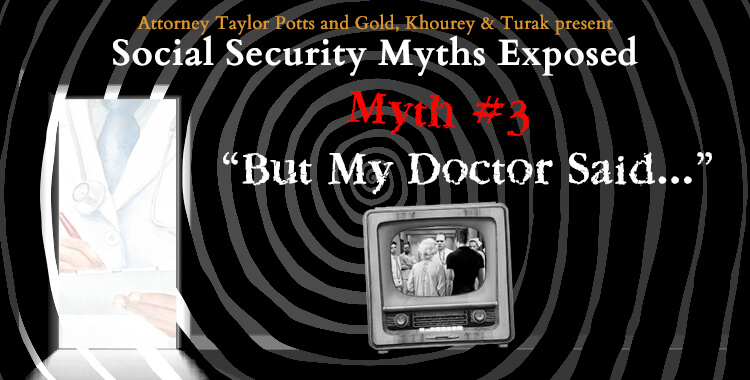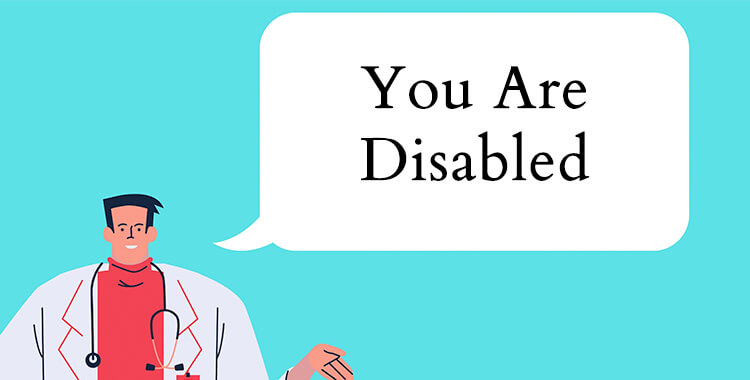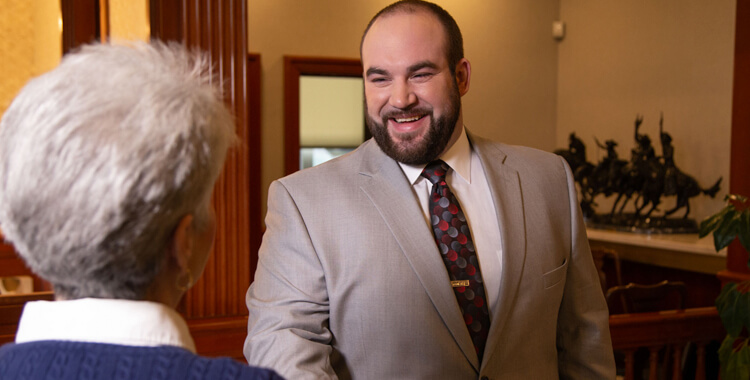
Every Tuesday, Social Security Disability Attorney Taylor Potts will expose some of the more frequent myths surrounding Social Security Benefits. Be sure to “like” our Facebook page and stop back each week as Attorney Potts takes you through The Twilight Zone – Social Security Style. If you have questions about Social Security Disability or VA Disability benefits, contact Disability Attorney Taylor Potts at (304) 845-9750.
You are about to enter a land beyond what many of us know. A land that could almost be considered a different dimension. A dimension of medical records, vocational classifications, administrative law judges, and functional limitations. Strap yourself in and get ready as we enter the twilight zone of Social Security Disability benefits.
WARNING! PROCEED WITH CAUTION
It can be a strange and confusing land, but allow me to be your guide as we (hopefully) shed some of this mystery and bring it back into the realm of reality. In this series we will take some of the most common (12 to be exact) misunderstandings or myths about Social Security Disability Insurance and Supplemental Security Income and help explain why these myths are not necessarily true and why the myths became so pervasive.
“BUT MY DOCTOR SAID. . .”
As a disability attorney, one of the more common things I hear from prospective clients when discussing Social Security Disability benefits is, “my doctor told me I was disabled,” or some other version of this statement. While it’s a good idea to take the advice of your doctor to apply for or consider disability benefits, please understand that your doctor’s comments do not guarantee you will be awarded disability benefits. It is simply not true that because your doctor states you are disabled that you will be approved for Social Security Disability benefits.

However, it IS true that your doctor’s opinions regarding your medical condition(s) are very important. Your medical records are really the driving force behind your disability benefits claim. But, please keep in mind that your doctor’s opinions and your medical records are only a few pieces of the puzzle that the Social Security Administration takes into consideration when determining if you are disabled.
WHAT ARE THE PIECES?
There are a countless number of items that the Social Security decision-makers take into consideration. For the purposes of this blog, I will leave out the discussion of non-medical issues completely such as income, assets, current work, date last insured, etc. that could impact benefits eligibility. Although I cannot cover every single item that could be medically considered in a disability benefits claim, this blog should cover the basic considerations. If you have any specific questions, please do not hesitate to give me a call at (304) 845-9750 so we can discuss your specific claim in more detail.
When you look at the medical side of Social Security Disability benefits claims, there are essentially four basic things that the reviewer or administrative law judge takes into consideration:
- The medical opinions of your doctors (expressed in your medical records).
- The medical opinions of consultative examiners and medical experts retained by the Social Security Administration (generally expressed through exam reports or testimony).
- Statements from you regarding your physical and mental functioning.
- The reviewer’s or administrative law judge’s opinions regarding your physical and mental functioning.
Each of these things will be given weight (i.e. how much the decision maker believes them and relies upon them to make their decision). The reviewer or administrative law judge will then combine all of these to make their decision regarding if you are medically disabled.
THE SOCIAL SECURITY LAW IS THE LAW!
You may still be asking yourself, “how can my doctor tell me my medical conditions are disabling and Social Security still find I don’t qualify for benefits?” A doctor is a medical professional who should know if a condition is disabling, right?
Well, yes and no.
While your doctor can believe you are disabled, in order to receive disability benefits you must be considered disabled by the Social Security Administration. The Social Security Administration’s decision of whether or not you are disabled is one of law, not science or medicine. To be considered disabled for the purposes of Social Security Disability benefits, you have to meet the legal definition of disability as seen through the eyes of the Social Security Administration.

For the most part, the determination of disability boils down to six (6) questions:
- Are you covered by a Social Security Disability program (i.e. do you have the necessary work credits for Disability Insurance coverage or do you meet the financial needs criteria to be considered for Supplemental Security Income, etc.)?
- Are you currently engaged in Substantial Gainful Activity (i.e. are you currently working at what is considered full-time by the Social Security Administration)?
- Does the medical evidence available establish that you meet a disability listing?
- If no listing is met, what is your residual functional capacity to work?
- Given your residual functional capacity to work, could you return to a job in which you had prior experience?
- If you could not return to past work, are there other jobs available to you in the national economy?
As you can see, this takes into consideration much more than simply your medical condition(s). Each of the questions that are used to establish disability also contain their own complicated considerations. Many of which your doctor is likely not considering when he/she tells you that you are disabled.
Furthermore, two other common issues with doctor’s opinions arise in the context of disability claims.
First, in order for any doctor opinions to be considered, that information must be included in the written medical records provided to the Social Security Administration. This means that your doctor simply telling you something during one of your appointments has no impact on your claim unless it is also documented in your medical records.

Second, depending on the nature of the information your doctor provides in your medical records, his/her opinion may have little or no impact on the decision of the Social Security Administration. For example, if your doctor only included in your medical records that due to X and/or Y condition you are disabled and unable to work, it would likely be of little benefit for your disability claim. The Social Security Administration requires more detail regarding your physical and/or mental limitations, such as a finding that you cannot lift more than 5 lbs., you can only be on your feet for two hours at a time, you have limitations in understanding, etc. The reviewers or administrative law judges are better able to use this type of information to determine if you are medically disabled under Social Security’s rules.
GKT Disability Attorney
We understand the confusion when your doctor tells you that you are disabled, then Social Security denies your disability claim. It can be frustrating but don’t give up. It doesn’t necessarily mean you have a bad case, it may just mean you need help applying for benefits.
We can help.
At GKT, we know and understand the Social Security system. We have helped thousands of people throughout the Ohio Valley obtain the Social Security Disability Benefits they deserve, and our disability attorney may be able to help you too. If you have been denied for Disability Insurance, Supplemental Security Income, Survivors Benefits, VA Benefits, or any other Social Security benefit, you only have 60 days to appeal.

Contact us today at (304) 845-9750 for a free consultation. The consultation is free, and you owe us nothing until we win you your benefits.


